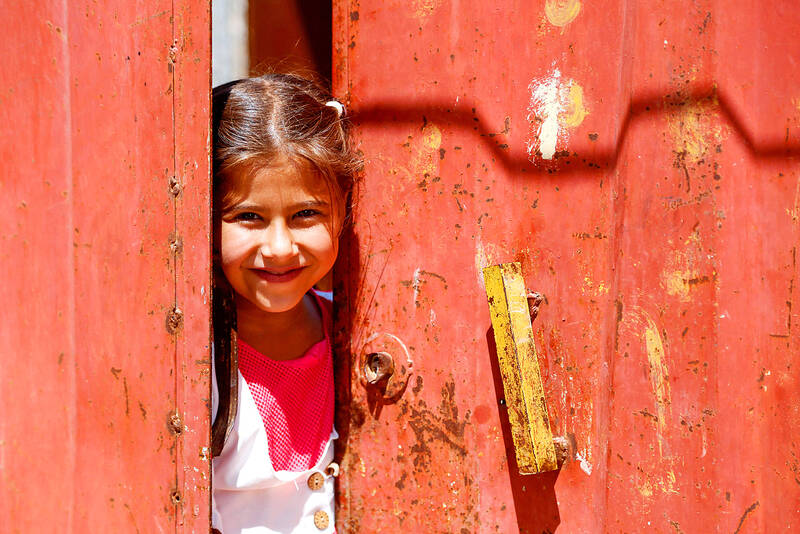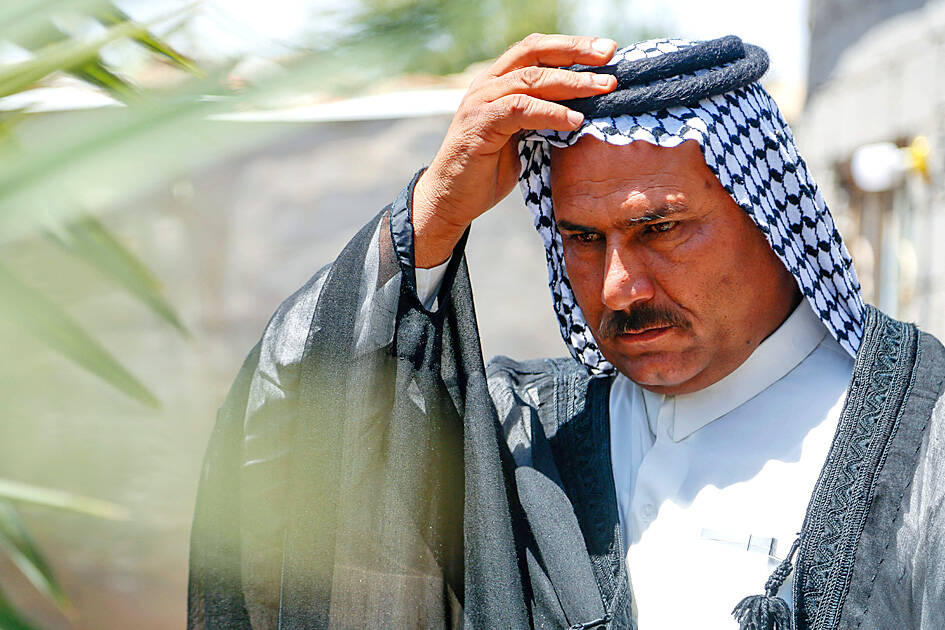Haydar Mohamed once grew wheat and barley, but Iraq’s relentless drought has forced him off the land and into the city, where he now works in construction and drives a taxi.
“The transition is difficult,” said Mohamed, 42, who abandoned village life several years ago for a shantytown in the central city of Karbala.
He is part of a growing wave of climate migrants in Iraq.

Photo: AFP
Years of dire water scarcity left him no choice but to move, the father of five said.
“If you don’t work, you don’t eat,” he said.
Until 2017, Mohamed, like his father before him, worked farmland in the remote village of al-Khenejar in Iraq’s southern Diwaniya Province.

Photo: AFP
In a good year, they would harvest 40 or 50 tonnes of grain, he said.
However, “water shortages have impacted farmland and livestock,” said the man with a neat moustache and a traditional black robe worn over a white gown.
“In our region, there is no work,” he said. “I have children in school, which involves expenses. We needed a livelihood.”
He now earns about US$15 a day on construction sites in the Shiite city, which thrives thanks to a steady flow of religious pilgrims.
To supplement his income, he works shifts as a taxi driver.
Near his home, cows graze on rubbish strewn across the dusty ground and gray cinderblock buildings line the bumpy alleys, connected for free by the municipality to power lines and water pipes.
The UN ranks Iraq, still recovering from decades of dictatorship and war, as one of the world’s five countries most impacted by some effects of climate change.
The economy is driven by oil exports, but the second-biggest sector is agriculture, which makes up 5 percent of GDP and employs 20 percent of the workforce.
Water scarcity is extreme in the country of 42 million that endures blistering summer heat and regular dust storms, the shortfall worsened by upstream river dams in Turkey and Iran.
The UN says that nearly one in five people live in an area hit by water shortages, while state authorities have been forced to limit areas designated for cultivation.
In central and southern Iraq, “12,212 families were still displaced due to drought conditions” in March, the UN International Organization for Migration (IOM) said.
Across Diwaniya, 120 villages now rely on trucked water deliveries, up from 75 last summer, Diwaniya Governor Maitham al-Chahd said.
“Thousands of hectares have been abandoned,” he said.
Among the other worst-hit provinces are Dhi Qar and Maysan, said the IOM, which estimates that 76 percent of displaced people move to cities.
The rural flight piles pressure on urban areas where infrastructure is dilapidated after decades of conflict, corruption and mismanagement.
A UN report last month warned of the risk of “social unrest” driven by climate factors.
“In the absence of sufficient public services and economic opportunity ... climate-driven urbanization and mobility can reinforce pre-existing structures of marginalization and exclusion,” the report said.
Al-Chahd said that rural migrants faced unemployment in the cities, where there “are not enough job opportunities” for all the newcomers.
“Public services cannot meet the needs of growing city populations,” he added.
Meanwhile, rural areas are being deserted, including the village of al-Bouzayad, where the main irrigation canal has completely dried up.
About 100 families have left in the past two years, and today only 170 households are still listed on the municipal register, said al-Bouzayad Mayor Majed Raham, several of whose relatives have joined the exodus.
Abandoned adobe houses sit next to unfinished yellow-brick constructions. In one empty dwelling, rooms stripped of their doors and windows show signs of the lives that have been upended.
Portraits of Shiite figure Imam Hussein still hang on the walls, a padlocked room contains personal items and a satellite dish gathers dust in the courtyard.
Those who have stayed depend on insufficient water deliveries made by tankers sent by the governorate authorities, which they deplore.
Raham said that most survive on either state benefits or money earned by their children, who commute daily to the nearest town.
“The majority want to leave, but they don’t have the means,” he said.

Kehinde Sanni spends his days smoothing out dents and repainting scratched bumpers in a modest autobody shop in Lagos. He has never left Nigeria, yet he speaks glowingly of Burkina Faso military leader Ibrahim Traore. “Nigeria needs someone like Ibrahim Traore of Burkina Faso. He is doing well for his country,” Sanni said. His admiration is shaped by a steady stream of viral videos, memes and social media posts — many misleading or outright false — portraying Traore as a fearless reformer who defied Western powers and reclaimed his country’s dignity. The Burkinabe strongman swept into power following a coup in September 2022

TRUMP EFFECT: The win capped one of the most dramatic turnarounds in Canadian political history after the Conservatives had led the Liberals by more than 20 points Canadian Prime Minister Mark Carney yesterday pledged to win US President Donald Trump’s trade war after winning Canada’s election and leading his Liberal Party to another term in power. Following a campaign dominated by Trump’s tariffs and annexation threats, Carney promised to chart “a new path forward” in a world “fundamentally changed” by a US that is newly hostile to free trade. “We are over the shock of the American betrayal, but we should never forget the lessons,” said Carney, who led the central banks of Canada and the UK before entering politics earlier this year. “We will win this trade war and

‘FRAGMENTING’: British politics have for a long time been dominated by the Labor Party and the Tories, but polls suggest that Reform now poses a significant challenge Hard-right upstarts Reform UK snatched a parliamentary seat from British Prime Minister Keir Starmer’s Labor Party yesterday in local elections that dealt a blow to the UK’s two establishment parties. Reform, led by anti-immigrant firebrand Nigel Farage, won the by-election in Runcorn and Helsby in northwest England by just six votes, as it picked up gains in other localities, including one mayoralty. The group’s strong showing continues momentum it built up at last year’s general election and appears to confirm a trend that the UK is entering an era of multi-party politics. “For the movement, for the party it’s a very, very big

‘BODIES EVERYWHERE’: The incident occurred at a Filipino festival celebrating an anti-colonial leader, with the driver described as a ‘lone suspect’ known to police Canadian police arrested a man on Saturday after a car plowed into a street party in the western Canadian city of Vancouver, killing a number of people. Authorities said the incident happened shortly after 8pm in Vancouver’s Sunset on Fraser neighborhood as members of the Filipino community gathered to celebrate Lapu Lapu Day. The festival, which commemorates a Filipino anti-colonial leader from the 16th century, falls this year on the weekend before Canada’s election. A 30-year-old local man was arrested at the scene, Vancouver police wrote on X. The driver was a “lone suspect” known to police, a police spokesperson told journalists at the